
The United States Army Pacific (USARPAC) is an Army Service Component Command (ASCC) designated by the Secretary of the Army (SECARMY); it may also serve as a Joint Task Force headquarters. It is the army component unit of the United States Indo-Pacific Command, and its mission is to support the Commander, United States Indo-Pacific Command. The main areas that this command has jurisdiction in include Alaska, Hawaii, the Pacific Ocean, Japan, and South Korea. It also performs missions in Southeast Asia, in the countries stretching from the Philippines all the way to Bangladesh and India. United States Forces Korea (USFK) has had operational command and control of US Forces in Korea since January 2012, and USARPAC headquarters oversees the manning, training, and equipping of US Army forces assigned to USFK.

Lieutenant General Michael David Maples, USA served as the 16th Director of the Defense Intelligence Agency (DIA), appointed on November 4, 2005. He was promoted to lieutenant general on November 29. Maples also commanded the Joint Functional Component Command for Intelligence, Surveillance and Reconnaissance (JFCC-ISR) for the United States Strategic Command (USSTRATCOM). He transferred his Directorship of the Defense Intelligence Agency and his command of JFCC-ISR to LTG Ronald Burgess on March 18, 2009. Maples formally served as the vice director of management of the Joint Staff.
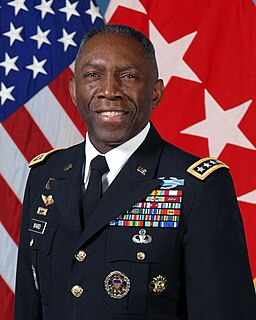
William E. "Kip" Ward is a retired United States Army three-star general who served as the inaugural Commander of United States Africa Command from October 1, 2007 to March 8, 2011. During his long career in public service, he has taught international affairs and relations at West Point, US Military Academy; served as Commander of Stabilization Force, Operation Joint Forge, Sarajevo, Bosnia; was appointed the Secretary of State's Security Coordinator to the Israel - Palestinian Authority; Deputy Commander, Headquarters US European Command, Stuttgart, Germany; and many other progressively responsible assignments. He later retired and served as President and chief operating officer of the logistics, IT, and engineering business, Vectrus.
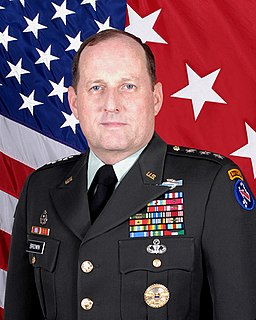
John M. Brown III is a retired lieutenant general of the United States Army. He served as Commander of United States Army Pacific, headquartered at Fort Shafter, Hawaii, from August 25, 2004 to February 1, 2008. He enlisted in the Army as an infantryman in 1969 and became an officer upon completion of Infantry Officer Candidate School in 1971 where he was commissioned a second lieutenant of Infantry.

Curtis Michael "Mike" Scaparrotti is a retired United States Army four-star general who last served as the Commander of United States European Command. He concurrently served as NATO's Supreme Allied Commander Europe. Scaparrotti previously served as the Director of the Joint Staff. Prior to his tour with the Joint Staff, Scaparrotti served as Commander, International Security Assistance Force Joint Command and Deputy Commander, U.S. Forces – Afghanistan, the Commanding General of I Corps and Joint Base Lewis-McChord, and the Commanding General of the 82nd Airborne Division.

William H. Brandenburg is a retired major general in the United States Army. He last served as Deputy Commanding General, U.S. Army, Pacific, August 8, 2003. Prior to his last assignment, he was Deputy Commanding General for Training and Readiness, I Corps and Fort Lewis. From November 29, 2004, until December 1, 2005, he deployed to Iraq as Deputy Commanding General and Commanding General Task Force 134.

R. Steven Whitcomb is a retired United States Army lieutenant general. He was commissioned as a second lieutenant upon graduation from the University of Virginia in 1970. In his final assignment he served as Inspector General of the United States Army.

Lieutenant General Michael S. Tucker is a retired United States Army general who served Commanding General of the First United States Army from 2013 until 2016. He formerly served as the Commanding General of the 2nd Infantry Division.

Lieutenant General Kevin T. Campbell was the commander of the U.S. Army Space and Missile Defense Command from December 2006 to December 2010, replacing Lieutenant General Larry J. Dodgen. In October 2011 Campbell began working for Northrop Grumman Corporation as vice president and corporate lead executive (CLE) for company business after retiring from the Army.

Benjamin Randaulph "Randy" Mixon is a retired lieutenant general in the United States Army who last served as commanding general of United States Army Pacific. Prior to that, Mixon served as the commander of the Multi-National Division North in Iraq.

James L. Terry is a retired lieutenant general of the United States Army. Terry has commanded at multiple levels across the Army. Terry's last assignment was as the commanding general of United States Army Central, retiring 17 November 2015. Terry served as the last commander of V Corps before its inactivation in 2013. While commanding V Corps, he concurrently served as Commander, International Security Assistance Force Joint Command (IJC), and as deputy commander of United States Forces Afghanistan. He was the Commanding General of the 10th Mountain Division from 2009 to 2011.

Lieutenant General Richard Maxwell "Rick" Burr, is a senior officer in the Australian Army and was formerly the Chief of Army, from 2 July 2018 until 1 July 2022. He served as Commander 1st Division from 2011 to 2012, Deputy Commanding General – Operations, United States Army Pacific from January 2013 to November 2014, and Deputy Chief of Army from 2015 to 2018.

Malcolm Bradley Frost is a retired United States Army major general who last served as Commanding General, Center for Initial Military Training, United States Army, Training and Doctrine Command, Fort Eustis, VA. MG Frost most recently served as Chief of Public Affairs for the U.S. Army at the Pentagon in Washington, DC. Frost's previous assignment was Deputy Commanding General of the 82nd Airborne Division at Ft. Bragg, NC from March 2014 to March 2015. In March 2014, Frost completed his assignment as Deputy Director for Operations at the National Military Command Center, J3 the Joint Staff at the Pentagon. Prior to that, he completed an assignment as the Deputy Chief of Staff for Operations (G3/5/7) for the United States Army Pacific (USARPAC). and commanded the 2nd Stryker Brigade Combat Team, 25th Infantry Division.

John Francis Campbell is a retired United States Army general who was commander of the Resolute Support Mission and United States Forces – Afghanistan. He was the 16th and last commander of the International Security Assistance Force. Prior to this, he served as the 34th Vice Chief of Staff of the United States Army. He is currently a member of the board of directors of IAP, and BAE Systems, and serves on the advisory board of Code of Support Foundation.
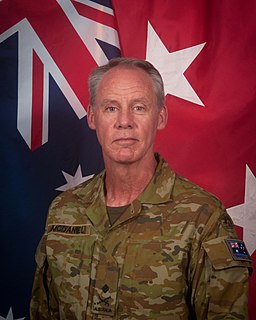
Major General Daniel Francis McDaniel, is a senior officer in the Australian Army. He served as the acting Special Operations Commander Australia from September 2013 to December 2014, after Major General Gus Gilmore was reassigned. He was seconded to the United States Army Pacific as Deputy Commanding General – North from January 2019 to January 2022.

Mark J. O'Neil is a retired United States Army major general who last served as the commander of U.S. Army Alaska. He previously served as the commanding officer of Delta Force from July 2, 2009 to August 2011. He has participated in numerous combat operations, such as; the wars in Iraq and Afghanistan. He assumed his final assignment on July 12, 2017, before retiring in 2019.
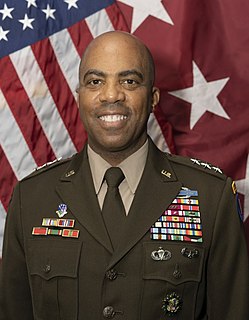
Ronald Patrick "Ron" Clark a United States Army lieutenant general who serves as the senior military assistant to the United States Secretary of Defense. He previously commanded the United States Army Central from from 2021 to 2022. He also served as the Chief of Staff, United States Indo-Pacific Command. He previously served as the commander of the 25th Infantry Division, and, before that, as the Chief of Staff, United States Army Pacific.

Charles A. Flynn is a United States Army general who serves as commanding general of United States Army Pacific since June 4, 2021. He previously served as Deputy Chief of Staff for Operations, Plans and Training (G3/5/7) of the Army Staff from June 2019 to May 2021. He is the younger brother of Lieutenant General Michael T. Flynn, the 24th United States National Security Advisor, and first to Donald Trump.
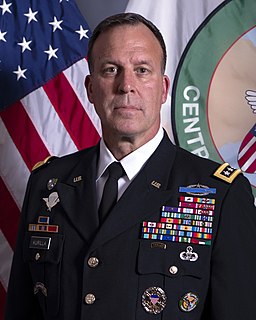
Michael Erik Kurilla is a United States Army general who serves as the 15th commander of United States Central Command since April 1, 2022. He previously served as the commanding general of the XVIII Airborne Corps and before that as the chief of staff of the United States Central Command.

The Commanding General of United States Army Pacific is the commander of United States Army Pacific, the army service component command of United States Indo-Pacific Command (USINDOPACOM). As CG USARPAC, the officeholder is responsible for United States Army forces stationed within INDOPACOM's area of operations, including Hawaii, South Korea and Japan. United States Army Alaska was initially under CG USARPAC's authority until it was transferred to United States Northern Command.























